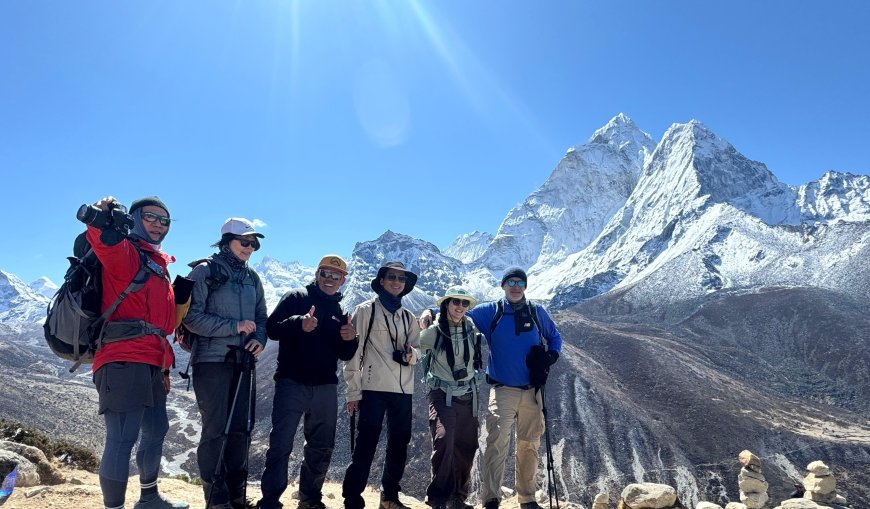How to Avoid Common Scams on Your Everest Base Camp Journey
Join the classic Everest Base Camp trek for adventure, culture, and Himalayan vistas.

Everest Base Camp Trek is an incredible experience. But like many popular spots, it comes with some risks if you're not ready. Knowing about common scams and how to steer clear of them can make your trip much safer and easier.
One common scam is getting charged way too much for permits, flights, or gear. Always book your trek and Lukla flight with a reliable company or directly through the official airline website. Watch out for street agents offering deals that seem too good to be true.
Another issue is hiring guides or porters who arent licensed. Without proper training, this can put your safety at risk. Make sure your guide has the right certification and speaks your language well. Some shady companies might take all your money upfront and then vanish, so do your homework and pay in parts if you can.
In some villages, tourists might get tricked into paying much more for basic items or services. Always settle on the price for places to stay, meals, or extras like hot showers or Wi-Fi before using them. Be careful about giving money to charities or religious sites that push for donations. Its better to go through official channels or trusted locals.
By staying aware, booking with licensed operators, and understanding local customs, you can dodge scams and fully enjoy the stunning scenery, rich culture, and great experiences the Everest Base Camp trek has to offer.
Spotting Fake Trekking Agencies in Kathmandu
Before you hit the trails, be careful of scams in Kathmandu. There are a lot of unregistered or fake trekking agencies that offer cheap packages for Everest Base Camp. These places might not have the right licenses, insurance, or trained guides. They could take your money and vanish, or give you a poor experience. Always check if the company is registered with the Nepal Tourism Board and linked to TAAN (Trekking Agencies Association of Nepal). Look at reviews on third-party sites like TripAdvisor or Google, not just their site. Some scammers create fake reviews or try to rush you into a decision on the street. Booking with a well-known agency helps keep you safe and ensures a better trek.
Avoiding Overpriced Gear and Equipment Rentals
Many new trekkers get tricked into paying too much for gear rentals in Thamel, the spot for trekking gear in Kathmandu. Some shops charge high prices for used or low-quality items, especially if you dont know the real prices. Others might rent out faulty gear that could fail on the trail. To dodge this, do a little research on what you need and how much it should cost. Ask your trekking company for trustworthy gear shops or think about buying from reliable stores like Shonas Alpine or Mountain Hardwear. Always test rented gear, especially sleeping bags and jackets, before you go. Knowing what you need helps keep you warm and dry without wasting money.
Recognizing Guide and Porter Scams on the Trail
While there are many good guides and porters, some unlicensed folks might act like they are pros to trick tourists. They might offer cheaper rates, but they dont have the proper training or insurance. Some might bail on you during the trek or ask for more money out of nowhere. To avoid this, hire guides and porters through a registered agency or check their credentials. A licensed guide will show a government-issued ID and generally speak decent English. Dont hire people you bump into randomly in Lukla or along the trail without any references. It can be tempting to save a few bucks, but your safety and experience depend on your support team. A good guide keeps you safe and handles logistics, so communication goes smoothly.
Preventing Accommodation and Meal Price Inflation
In the Everest region, many tea houses have a cheap room, eat here deal you get a good price for a room if you eat there too. But some lodge owners might jack up prices or hit you with hidden fees for basics like blankets or hot showers. To avoid this, always confirm what's included in the room cost and if meals are mandatory. Ask about charges for Wi-Fi, phone charging, or extra bedding ahead of time. Having a local guide can help you get fair prices, especially at higher altitudes where choices are limited. Bringing a price list or checking recent reviews also helps you negotiate. Knowing what to expect makes your trek more enjoyable and scam-free.
Identifying Fake Donations and Temple Fees
Some scammers pretend to be monks or charity workers, especially in Kathmandu and around trekking spots, trying to get tourists to give money for fake causes. They might offer prayer beads or blessing scarves and then ask for cash. This isn't how genuine Sherpa or Buddhist customs work. Real religious sites, like Tengboche Monastery, accept voluntary donations, but they dont pressure you. Always ask your guide before you give money to any local group. If you want to help, donate through registered NGOs or schools that the trekking agencies can vouch for. Supporting the right causes helps the community and keeps you safe from scams. Recognizing these fake donation schemes keeps your money where its needed.
Keep Your Guard Up About Flight Ticket Scams to Lukla
Flights to Lukla, which is the way to Everest Base Camp, are often targeted by scammers who sell fake or overpriced tickets. Because there arent many flights, it can be tempting to trust unofficial agents. To steer clear of this, always book your Lukla flights through the official airline websites like Tara Air or Summit Air, or your licensed trekking company. Avoid buying tickets from strangers or unverified sources. Be sure to check your ticket for the right flight details and confirmations. Showing up at the airport without a valid ticket can lead to delays and stress. Planning your flights early and through trustworthy sources will help you kick off your Everest Base Camp adventure on the right foot.
Beware of Fake Travel Insurance Offers
Travel insurance is key when trekking at high altitudes, but watch out for fake or poor-quality policies offered by unlicensed agents in Kathmandu. Some vendors may sell cheap insurance that doesnt cover important things like helicopter evacuation or medical emergencies. Always go for insurance from reliable providers that cover trekking above 4,000 meters. Make sure to check the policy details, including emergency evacuation and COVID-19 coverage. Many trekking companies can point you toward trusted insurance partners or give you options that include insurance. Be sure to keep a printed copy of your policy with you during the trek. Having the right insurance helps protect your health, wallet, and peace of mind while trekking to Everest Base Camp.
Tips to Avoid Currency Exchange Scams in Nepal
Currency exchange scams pop up often in touristy parts of Kathmandu, where unlicensed money changers might give you counterfeit notes or shortchange you. Always use authorized exchange counters, banks, or ATMs for getting Nepali rupees. Count your cash carefully before leaving the counter and familiarize yourself with the look of real Nepali banknotes to spot any fakes. Avoid exchanging money on the street or with anyone offering rates that seem too good to be true. When you can, carry smaller bills to make paying for small purchases or tips easier. Having local currency is important for tea houses, transport, and tips along the EBC trail. Staying alert during currency exchanges helps you dodge scams and keeps your trek on track.
Protect Yourself from Mobile and Internet Scams
Travelers in Nepal using local SIM cards or public Wi-Fi need to watch out for scams. Some fake SIM sellers might provide invalid or blocked numbers, which can leave you without a way to reach help in emergencies. Buy SIM cards only from authorized outlets of providers like Ncell or Nepal Telecom, and make sure to register your SIM with your ID. Public Wi-Fi at lodges or cafes is often not secure, so its best not to input personal info or log into sensitive accounts. Use VPN services for safer browsing and avoid online transactions when on public networks. Staying connected safely helps you keep in touch with guides, check the weather, and stay connected with family, making your Everest Base Camp journey less stressful.
How to Deal with Unexpected Situations Without Falling for Scams
Unexpected issues like illness, weather delays, or lost gear can make trekkers targets for scams. Some locals might offer overpriced emergency services or unnecessary equipment rentals. Always check with your guide or trekking company first during emergencies. Make sure you have essential supplies, like a basic first aid kit, extra cash, and a portable charger. If any extra costs come up, confirm them upfront and try to get written estimates if you can. Avoid giving money to strangers claiming they can help unless theyve been verified by your guide. Being ready and staying calm will help you handle surprises without getting caught in scams. Rely on your guides experience to manage emergencies safely and cheaply.
How to Steer Clear of Scams
To keep scams at bay, you need to stay alert and do your homework. Start by looking into where you're going, especially checking what other travelers have encountered. Always stick to well-known service providers for bookings, transport, and places to stay. Make sure to verify things like licenses and reviews before making any decisions. Keep your info and valuables safe, and be wary of deals that seem too good to be true. When paying, go for methods that offer tracking and try to avoid cash with strangers. Watch out for friendly folks offering helpsometimes, they're not what they seem. Staying informed, cautious, and trusting your gut will help you enjoy your travels without falling for scams.
Tips for Avoiding Scams While Traveling
When you hit the road, always plan. Book through trusted sources and official channels, and don't share your plans or personal info widely. Keep copies of important documents safe and separate. Be cautious in busy areas, especially if someone seems overly eager to helpyou could be getting set up for theft. Use credit cards or prepaid options instead of cash when you can. Learn about common scams at your destination, like taxis that mess with the meter or fake charities. Finally, stay aware of your surroundings and keep your cool if someone approaches you unexpectedly. Staying sharp and cautious will help protect your belongings during your trip.
The Key Rule for Avoiding Scams
The main rule to remember is: If it sounds too good to be true, it probably is. This keeps you grounded when deals pop up. Scammers love to lure people in with great prices or 'exclusive' offers that rush you into a decision. Take your time to check facts, consult trusted sources, and dont rush into anything. A little patience and common sense, alongside some solid research, can go a long way in keeping you safe from scams.
How to Avoid E-Transfer Scams
To dodge e-transfer scams, never send money to people you dont know or cant verify. Always double-check the recipient's identity before sending any cash. Stay clear of sketchy links or unexpected requests for payment. Use secure platforms that have extra security features like two-factor authentication. Keep a close eye on your bank statements and report any strange transactions right away. When youre buying online, push for secure payment methods that protect buyers. Educate yourself on common e-transfer tricks, like phishing, to stay one step ahead and safeguard your finances.
Wrap-Up
Steering clear of scams takes awareness, good research, and careful actions. Whether you're heading to Everest Base Camp or anywhere else, being prepared is your best defense. Know the usual scams, stick with trustworthy providers, and remember the key rule: if something seems off, take your time. Being alert with your money and personal details adds an extra layer of safety. By following these tips, you can enjoy your travels and focus on all the great experiences out there without worrying about scams.


































